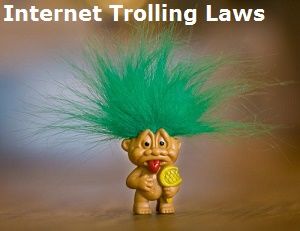ONLINE TROLLING: Often, the friction and hostility begins as arguments or inflammatory postings online.
Trolls deliberately provoke readers into emotional responses. Trolled abuse is usually conducted for their own satisfaction and amusement.
New Crown Prosecution Service legal guidelines aim to prosecute online trolls in the United Kingdom.
Prosecutors are set to tackle Internet abuse while trying to protect freedom of speech. The new guidelines will target online abusers who formulate derogatory hashtags.
Internet trolls posting doctored images of their victims via social media could also face prosecution under the same legal guidelines.
Online Trolls: CPS Offence Categories
- Communications that may constitute threats of violence to the person or damage to property.
- Communications that specifically target an individual or individuals and which may constitute harassment or stalking, controlling or coercive behaviour, disclosing private sexual images without consent, an offence under the Sexual Offences Act 2003, blackmail or another offence.
- Communications that may amount to a breach of a court order or a statutory prohibition.
- Communications that do not fall into any of the categories above fall to be considered separately (those which may be considered grossly offensive, indecent, obscene or false).
Criminal Charges for Internet Trolling
 Those who harass people on social media platforms will be accountable and liable for criminal charges in England and Wales. But, the Internet trolling laws aim to avoid stifling freedom of speech.
Those who harass people on social media platforms will be accountable and liable for criminal charges in England and Wales. But, the Internet trolling laws aim to avoid stifling freedom of speech.
The director of public prosecutions clarified the issue by saying;
“The Internet is not an anonymous place where people can post without any consequences. People should think about their own conduct.
If you are grossly abusive to people, if you are bullying or harassing people online, then we will prosecute in the same way as if you did it offline.”
Document Tracing: Doxxing Laws UK
Is Doxxing illegal in the United Kingdom? According to the UK Doxxing laws yes it is – and cowardly! Doxing (aka Discord Doxxing) is a shortened abbreviation of document tracing.
It is the Internet-based activity of researching and then publishing an individual’s personally identifiable details.
Document tracing is an example of potentially criminal behaviour. Not least because it involves publishing another person’s personal information. As a rule, the details would include someone’s home address or their bank details.
Virtual Mobbing Harassment
Similarly, the same social media laws aim to stop ‘virtual mobbing’. This is a practice whereby some individuals send messages and comment to (or about another) on chat platforms. Often, the harassment of the victim takes place because the perpetrators oppose the opinions of that person.
The new legal guidelines also tackle the humiliation of someone online. Branding a person as sexually promiscuous or posting disturbing altered images of victims on social mass media could end in prosecution.
But, it is likely to be a matter of judgment for the prosecutors. They will need to differentiate between sinister communication and humorous or inoffensive documentation.
Sexting (exchanging sexual images online)
The CPS gave their views on ‘sexting’ and reporting suspicious Internet activity. They said it would not necessarily be a subject of police investigation. Individuals who are the same age and in a relationship may not be committing a cybercrime.
The justice ministry statistics from 2015 showed a tenfold increase in Internet convictions over the past decade. Time will tell whether the new online trolling laws will improve successful prosecutions of Internet hate crime. The biggest concern is that many Internet abusers and offenders use a false identity.
Social Media Companies
Perhaps the two biggest social media companies, Twitter and Facebook, also agree with the need to silence Internet trolls and online bullies. But they continued to advocate for the protection of free speech online.
On the whole cyber campaigners welcomed the introduction but many expressed their doubts saying;
“We are living through an enforcement crisis. The rise of social media has happened in the blink of an eye. Without an enforcement response aligned to the legal one, this is not going to make much of a difference.”
ALSO IN THIS SECTION
Articles about Homes and Lifestyles: News stories on the rules for home and family life regulations.
BBC iPlayer Login Rules: All viewers will need to log in with a personal account ID from 2017.
House Raffle Laws UK: How betting on house raffles could be in breach of gambling regulations.
Reporting Suspicious Internet Activity: How to identify and report questionable Internet fraud.
WhatsApp Age Restrictions: New age limits on the messenger platform are banning kids under 16.

